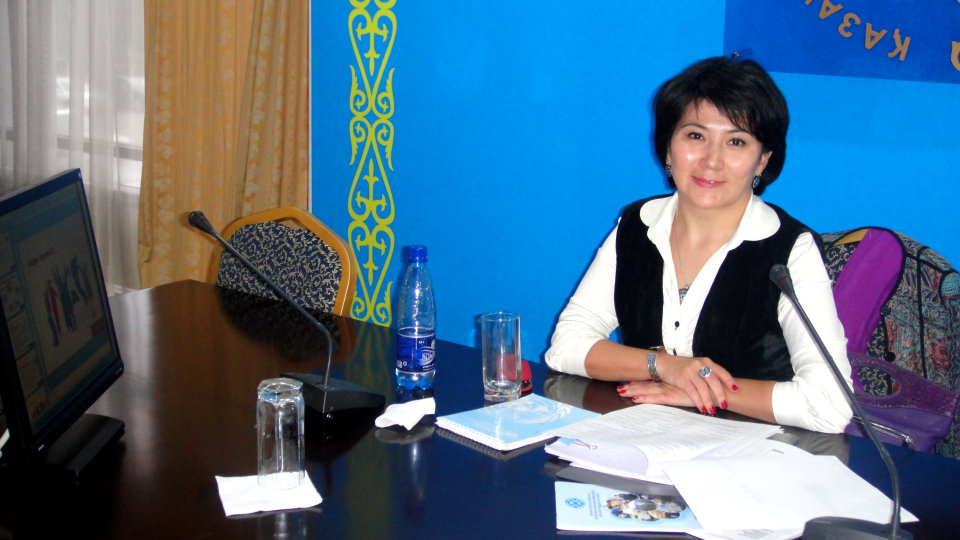Take Five: “Rural women’s access to the Internet is crucial for their economic empowerment”
Date:

Makhabbat Yespenova is the Executive Director of PF KAMEDA, UN Women’s partner in implementing the “Development of Concrete Policy Instruments for Rural Women Employment, including Entrepreneurship” initiative in Kazakhstan. The initiative aims to build the capacity of rural women, and to empower them economically through productive employment and entrepreneurship. Yespenova explains the key findings of a UN Women commissions analysis on rural women’s employment and entrepreneurship in three pilot regions of the country.
What are the key barriers to rural women’s employment in Kazakhstan?
Official statistics indicate that currently rural women account for over 3.9 million[1] of the total population [18.2 million[2] ] in Kazakhstan. Despite ongoing systemic efforts to support women’s economic empowerment and increase the share of women entrepreneurs in small and medium businesses [currently at 42 per cent[3] ], rural women remain at high risk of poverty. UN Women in Kazakhstan commissioned an analysis, under its “Development of Concrete Policy Instruments for Rural Women Employment, including Entrepreneurship” initiative, which revealed that the key barriers impacting women’s economic activity and their well-being included infrastructure maturity, access to public services and support, financial instruments, and lack of entrepreneurial knowledge and experience.
What is being done to address these barriers?
After conducting the analysis with UN Women in three pilot regions in 2018, we drew out recommendations for local governments, public development institutions, and civil society to improve the quality of life of rural women. The analysis contributed to the development of training modules designed to enhance applied entrepreneurial knowledge and skills as well as development of substantial projects and execution plans to promote rural women’s entrepreneurship. We emphasized the need to find a solution to funding gaps and infrastructure-related issues together with local authorities and governmental development institutions [National Chamber of Entrepreneurs Atameken, Entrepreneurship Development Foundation Damu, the Business Women Council]. The results and recommendations of the study were submitted to the Ministry of National Economy for further implementation through the national development initiative on modernization of social environment in rural areas (“Auyl Besigi”).
What are the key findings of the analysis with UN Women?
I should emphasize that existing problems are almost identical in all regions of Kazakhstan with minor variations. Specifically, the most critical issues associated with rural infrastructure development included lack of access to broadband Internet, problems with public transport [between nearby villages or a village and a district center], and supply of water, power and heat. Many female respondents reported insufficient childcare and leisure facilities, forcing them to spend most of their time on childcare, and care of other family members.
Women also brought up lack of quality healthcare services, limited opportunities for continuing education and training, especially in applied business knowledge, as major constraints for rural women’s productive employment.
The study revealed that rural women’s limited access to financial resources and government support programs [such as entrepreneurial initiatives] further aggravated their economic empowerment. Low representation of women in local governments contributes to a lack of recognition of women’s and girls’ needs and priorities reflected in local budgets, which also hinders women's economic empowerment.
In your opinion, which issues should the Government address immediately?
It is obvious that system-wide and not ad hoc measures are critical for eliminating existing barriers, which could improve the situation in a comprehensive manner.
However, first of all, I believe the focus should be on access to information [about social services, services by financial institutions, services in education, etc.]. An overwhelming majority of villages lack high-quality broadband Internet. It is not only a major constraint for the local population’s access to information, but also prevents rural women from accessing opportunities to do business using online technologies. Without effective access to the Internet, rural women cannot be informed about services of financial institutions and government support programs. They are not able to benefit from distance learning opportunities. It is more challenging for them to find business partners and set up communities of interest, thus the current government programs do not have the requisite effect.
How do you see the civil society’s role in addressing these issues? What drives you, as a civil society representative, to work on women’s empowerment?
Rural non-governmental organisations (NGOs), particularly civic centers, have the capacity and are well placed to address many local issues. It is them that local residents turn to for guidance, advice and assistance. Rural NGOs are aware of the challenges women face when they want to start up their own businesses. They could be an excellent resource for informing and training of rural women.
I am driven by the fact that I am a mother of two daughters and a son, and it is my dream that my children will live in their native Kazakhstan and be proud of their country as the country of equal opportunities. I strongly believe that what I am doing now will help my daughters and other girls to never get exposed to violence and have opportunities to realize their talents in any discipline or line of business they decide.
[1] Women and men of Kazakhstan 2013-2017
[2] Women and men of Kazakhstan 2013-2017
[3] http://gender.stat.gov.kz/page/frontend/detail?id=106&slug=1-2018&cat_id=6&lang=en